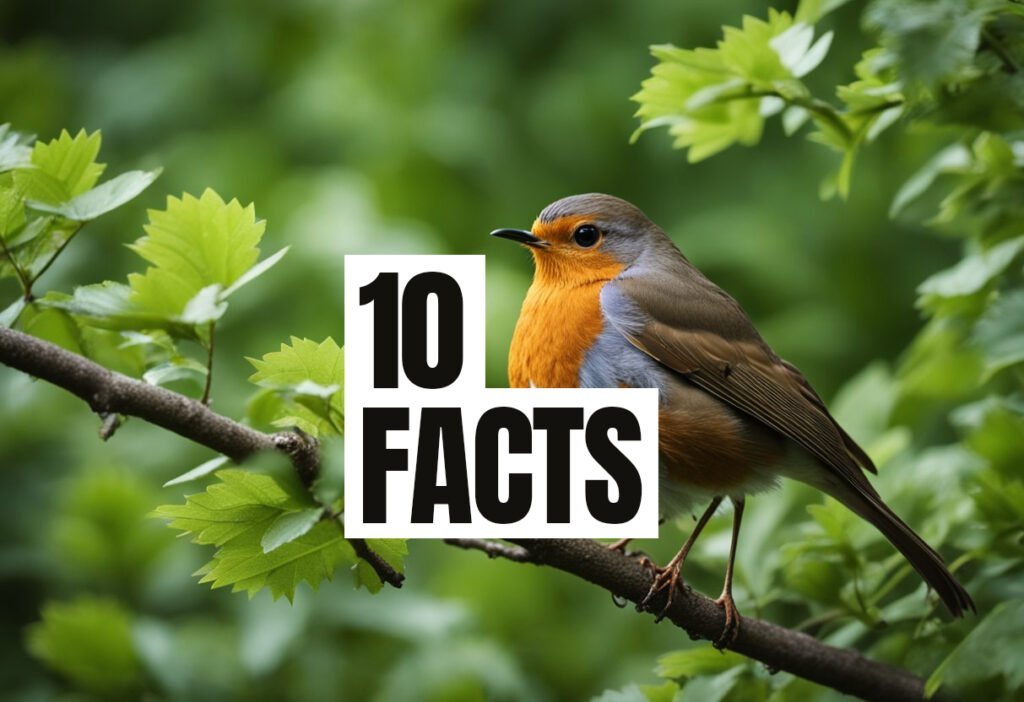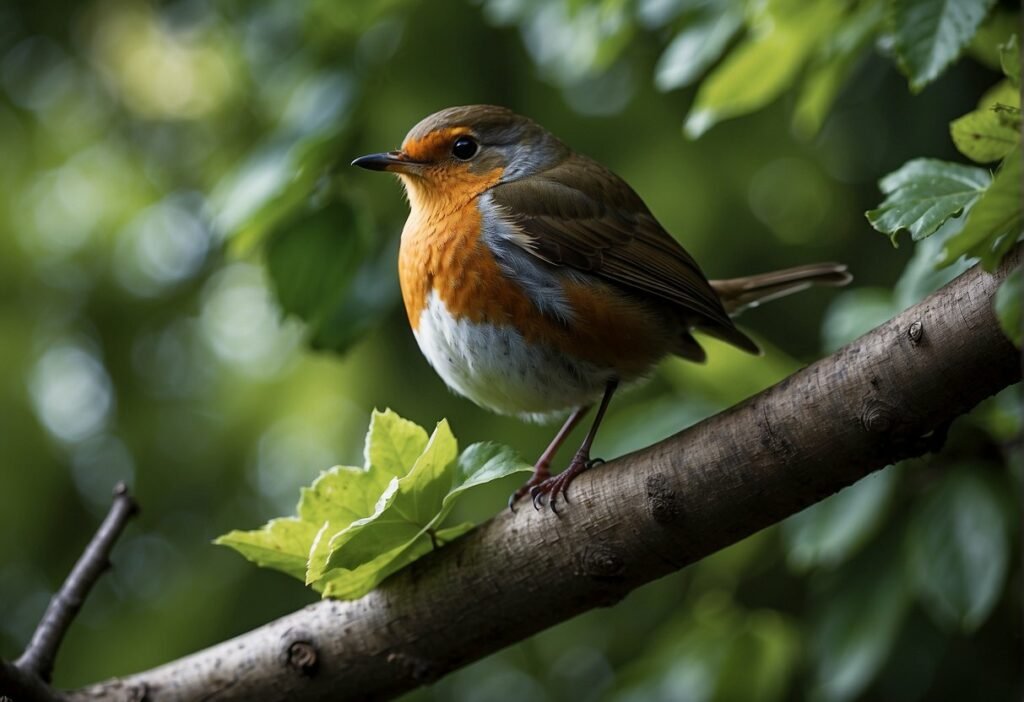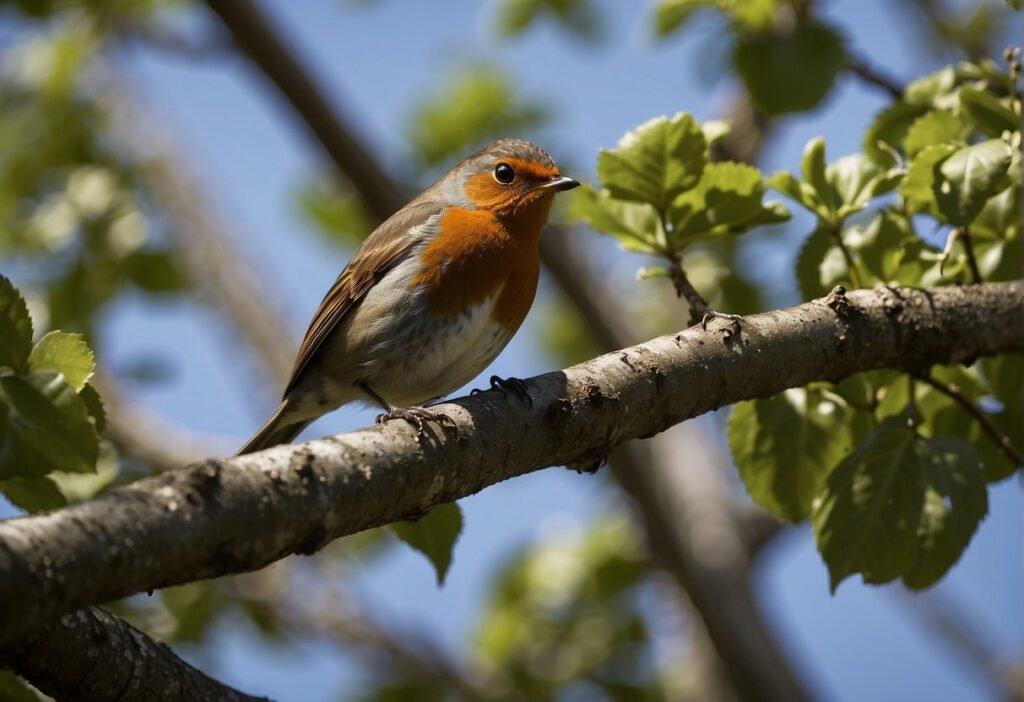Robins are a common sight in many gardens and parks, with their bright red breast and cheerful chirping. But have you ever wondered what these birds eat? In this article, we will explore the diet of robins and provide some interesting facts about their feeding habits.

Robins are omnivores, which means they eat both plants and animals. Their diet changes throughout the year, depending on what is available. In the spring and summer, robins feed mainly on insects such as beetles, caterpillars, and grasshoppers. They also eat spiders, earthworms, and snails. During the fall and winter, when insects are scarce, robins rely more on fruits and berries such as holly, mistletoe, and crabapples.
Robins are known for their ability to find food by sight rather than smell. They have excellent eyesight and can spot a worm from up to 50 feet away. They also have a unique way of finding food underground. When they detect movement in the soil, they hop forward and listen for the sound of the worm moving. Once they have located their prey, they use their beak to pull it out of the ground.
Dietary Habits of Robins
Robins are known for their distinctive orange-red breast and their melodious song. They are a common sight in gardens and parks, and are often seen hopping around on the ground searching for food. In this section, we will explore the dietary habits of robins, including their natural food sources, supplementary feeding, and seasonal variations in diet.
Natural Food Sources
Robins are omnivorous birds and have a varied diet. They feed on a range of food sources, including fruit, worms, insects, berries, earthworms, beetles, snails, nuts, caterpillars, and spiders. They have a particular fondness for earthworms, and can often be seen pulling them out of the ground with their beaks.
Supplementary Feeding
Robins are also known to supplement their natural diet with food provided by humans. They are often attracted to bird feeders, where they will eat seeds, mealworms, and suet. In urban areas, they may also scavenge for food in bins and compost heaps.
Seasonal Variations in Diet
The diet of robins varies throughout the year, depending on the season. In the summer months, they feed mainly on insects and other invertebrates, while in the winter, they rely more heavily on fruit and berries. In the fall, they may eat more nuts and seeds as they prepare for the colder months ahead.
Overall, robins are adaptable birds with a varied diet. They are able to find food in a range of environments and are not overly fussy about what they eat. Their diet varies depending on the season, but they are always on the lookout for their next meal.
Attracting and Supporting Robins in Your Garden
Robins are a common sight in many gardens, and with a little effort, you can attract and support them in your own backyard. Creating a robin-friendly environment involves providing food, water, shelter, and protection from predators. Here are some tips on how to attract and support robins in your garden.
Creating a Robin-Friendly Environment
Robins prefer gardens with plenty of bushes and trees for shelter and nesting, as well as open areas for foraging. Planting berry bushes such as hawthorn, dogwood, and crabapples can provide a natural food source for robins. They also enjoy fruits such as apples, blueberries, and strawberries.
Feeding Stations and Bird Feeders
Robins are ground feeders and prefer to feed on insects, worms, and other invertebrates. You can attract them to your garden by providing a ground feeding tray or bird table with mealworms, suet, and seeds. Robins also enjoy peanuts, sunflower hearts, and dried mealworms. Hanging feeders can be used, but make sure they are low enough for robins to access.
Protecting Robins from Predators
Robins are vulnerable to predators such as cats, hawks, owls, shrikes, crows, and blue jays. You can protect them by providing shelter such as dense bushes or evergreens. Keep cats indoors or use a cat deterrent. Avoid using pesticides and herbicides in your garden, as they can harm robins and their food sources.
In summary, attracting and supporting robins in your garden involves creating a robin-friendly environment, providing food and water, and protecting them from predators. With these tips, you can enjoy the beauty and behavior of robins in your own backyard.
Frequently Asked Questions
What types of food can I put in a bird feeder to attract robins?
Robins are known to eat a variety of foods, including insects, fruits, and seeds. To attract robins to your bird feeder, you can try putting out mealworms, suet, chopped fruit, or raisins. You can also try sprinkling some mealworms or raisins on the ground near your feeder to attract them.
Are there specific fruits that robins prefer?
Robins are known to enjoy eating a variety of fruits, including apples, cherries, and berries. They are particularly fond of berries such as elderberries, holly berries, and sumac berries. You can try putting out chopped fruits or berries in your bird feeder or on the ground near your feeder to attract robins.
How does a robin’s diet change during the winter months?
During the winter months, robins’ diets shift from eating mostly insects to eating more fruits and berries. This is because insects become scarce during the colder months. You can try putting out fruits and berries in your bird feeder or on the ground near your feeder to help robins during the winter.
Is it safe to feed bread to robins, and if not, what are the alternatives?
Bread is not a recommended food for robins as it can cause digestive problems and may not provide the necessary nutrients for their diet. Instead, you can try putting out mealworms, suet, chopped fruits, or raisins in your bird feeder or on the ground near your feeder.
Can robins eat sunflower seeds or suet, and which is better for them?
Robins can eat sunflower seeds and suet, but they are not their preferred food. Sunflower seeds and suet are higher in fat and protein than the insects and fruits that robins typically eat. If you choose to put out sunflower seeds or suet, make sure to also provide other foods such as fruits and mealworms to ensure a balanced diet for the robins.
Why might robins avoid eating from bird feeders, and how can I encourage them?
Robins may avoid eating from bird feeders because they prefer to forage on the ground for insects and fruits. To encourage robins to eat from your feeder, try putting out mealworms or chopped fruits on the ground near your feeder. You can also try placing your feeder near bushes or trees where robins like to perch.




